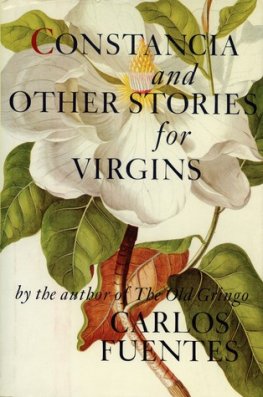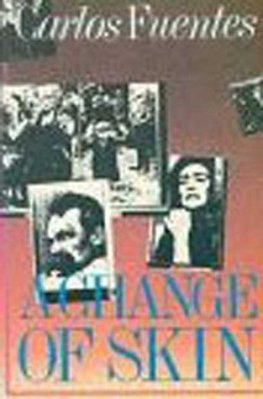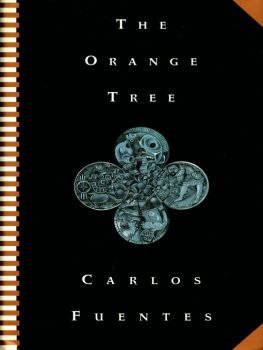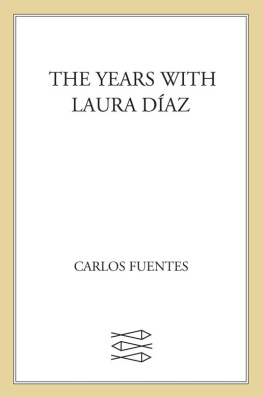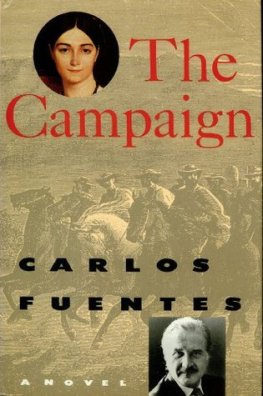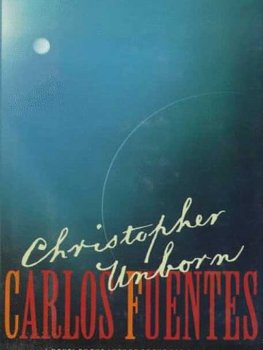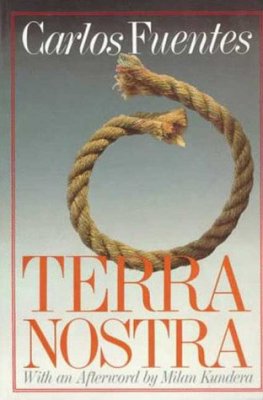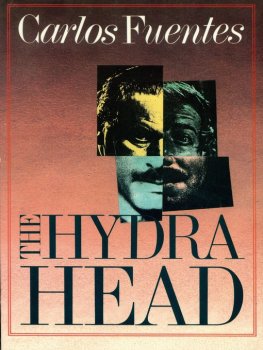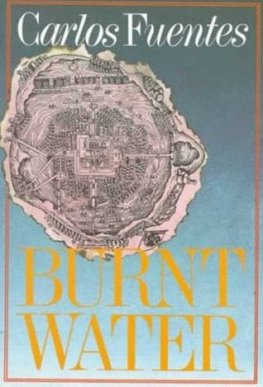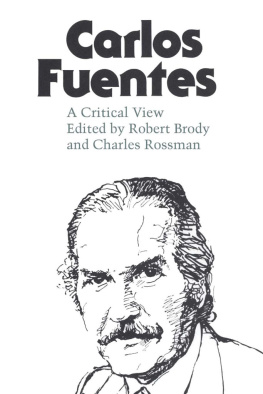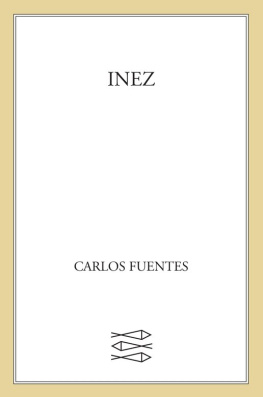Carlos Fuentes
Constancia and Other Stories for Virgins
Seal me with your eyes.
Take me wherever you are
Shield me with your eyes.
Take me as a relic from the mansion of sorrow
Take me as a toy, a brick from the house
So that our children will remember to return.
Mahmud Darwish, cited by Edward Said in Reflections on Exile
For Sadri and Kate, the refuge of friendship
1
The old Russian actor Monsieur Plotnikov visited me the very day of his death. He told me that the years would pass and I would come to visit him on the day of my own death.
I didnt understand his words very well. The heat of Savannah in August is like fitful sleep: you repeatedly seem to shudder awake, you think youve opened your eyes, but in fact youve only introduced one dream inside another. And, inversely, one reality adheres to another, deforming it until it seems a dream. But its nothing more than reality baked at 101. At the same time, its nothing less than this: my deepest dreams on summer afternoons are like the city of Savannah itself, which is a city inside another city inside
This feeling of being caught in an urban maze is a result of the mysterious plan that gave Savannah as many squares as stars in the heavens, or so it seems. A gridwork regular as a chessboard, beginning with a square from which four, six, eight streets lead off to three, four, five squares from which, finally, twelve, fourteen streets radiate, leading in turn to an infinite number of squares.
The mystery of Savannah, in this respect, is its transparent geometric simplicity. Its labyrinth is the straight line. Its clarity produces, paradoxically, a most oppressive feeling of disorientation. Order is the antechamber of horror, and when my Spanish wife once more opens her old book of Goya prints and stops at the most famous of the Caprichos, I dont know if I should disturb her fascination by remarking:
Reason that never sleeps produces monsters.
The immediate reality is simply this: the only solution (for me) is to sit on the porch of my house, in a rocker, with a round fan, trying to see off to the green, slow, fraudulent river, and not being able to make it out, consoling myself with the argument that since Im in the open air, I must feel cool.
My wife, wiser than I, understands that these old Southern houses were designed to keep out the heat, and she chooses to close the shutters, take off her clothes, and spend the afternoon hours between cool sheets, under a silently revolving ceiling fan. That is something she has done ever since her childhood in Seville. Still, we do have one thing in common air-conditioning gives us colds and sore throats; so we have agreed never to allow in our home one of those devices that stick out like pimples or scarred stumps from one or two windows of every house in the city.
They are ugly and they make the houses ugly. Savannahs domestic architecture dates from a period between the end of the eighteenth century and the third quarter of the nineteenth century; that is, the years between the independence of the Union and its severing in the Civil War, when our pride was greater than our sense of reality. The noble edifices of our city are symbols of two commerces, one famous, the other infamous. Cotton and slaves; blacks imported, white fibers exported. As an old Southerner, I appreciate the chromatic irony of this exchange. We sent out messengers as fresh and ethereal as clouds to the world, and in exchange we received flesh charred on the coals of hell. Still, irony is better than guilt, or at least I prefer to cultivate it, especially now that everything for which my ancestors so nobly and stupidly fought has been lost. Some statues survive, its true, but now theres a Hyatt Regency next to the river and a De Soto Hilton behind my house on Drayton Street proof that the Northern carpetbaggers, the mercenaries who profited from our defeat to annex us to their commerce, their values, their vulgarity, are still winning.
No one escapes these mercantile imperatives, not even I, who have so cultivated an understanding of my region and its history. Every week I travel to Atlanta to minister to my medical clientele, and from the airplane I see that there is no trace of the capital of Georgia, burned by Sherman in 1864. Skyscrapers, supermarkets, urban beltlines, elevators like cages of glass rising, brittle ivy, up the frozen skin of the buildings: plastic magnolias; defeats tasting of strawberry ice cream; history as television mini-series. I spend my Tuesdays, Wednesdays, and Thursdays in Atlanta, and Fridays I return to enjoy the weekend at home. It is my refuge, my asylum, yes. It is my dwelling place.
I return home with the feeling that for us this remains the city we built ourselves (despite the commercial incursions I have mentioned), where we received, to help in its construction, those refugees despite themselves, the blacks, who did not flee freely from Africa (if one can speak in that way about a refugee), but were dragged, in chains, out of their continent. Sometimes, rocking and trying to overcome the heat by thinking of the slow-moving river, or flying over Atlanta and trying to discover a single charred vestige of the past, I ask myself, old and somnolent now, if we have finally atoned for our guilt. How can we be done with it? Or does our well-being depend on our learning how to live with it forever? How long a vigil, I ask myself, does historical violence impose on us? When will we be allowed to rest? I seldom see the blacks of Savannah; I speak to them only when I have to. But I never stop asking what my history all comes down to: how far can or should my personal responsibility extend for injustices I did not commit?
2
I say that rocking in the open air is my strategy for feeling cool. I know that I am lying to myself. Its just a kind of autosuggestion. But anyone who has lived in extreme climates before artificial climatization knows full well that heat and cold are, more than anything, mental states that, like sex, literature, or power, are accepted or rejected at the very center of your existence, which is the mind. And if the head wont help us, then let us drink hot coffee in hot climates. That way, the inside and outside temperatures balance out; but, in hot weather, cold upsets the balance and we pay with hours of discomfort for a minute of relief. Would the inverse be true, in cold climates? Does eating ice cream help you through a Russian winter? I must ask Mr. Plotnikov, the next time I see him.
The reader of these hurried notes, which Im jotting down with the strange sense that I must do so now, before its too late, must understand that to say I saw or visited Mr. Plotnikov is to dignify what was really no more than a series of chance encounters. Sometimes there was an element of surprise in them. One time, in a shopping mall, I stopped to take some ID pictures in an automatic photo booth. The curtain was closed and I waited a long time. Some old-fashioned, laced-up black boots attracted my curiosity. When the curtain parted, Mr. Plotnikov appeared. He looked at me and said:
They make us choose our roles, Gospodin Hull. Just look, an actor obliged to have his picture taken to get a passport, what do you think of that? Dont you want to wait with me for the four photos to come out of the slot? he said, taking my arm with his gloved hand. Whose pictures do you think they will be? The actor? The private man? The Russian citizen? The apprentice set designer? The refugee in America? Who? He laughed, and feeling a little uneasy, I smiled as one smiles at a madman to placate him, for I must say that the old man, despite his apparent calm, also seemed uneasy.
I wondered if I should give in to my curiosity and wait for Mr. Plotnikovs photographs to appear. I laughed, thinking how we sometimes make ridiculous faces without realizing it, staring at the hidden, shuttered, aggressive eye of the camera. But his question pursued me. Which of our multiple personalities is caught, at any given moment, by a photograph?

